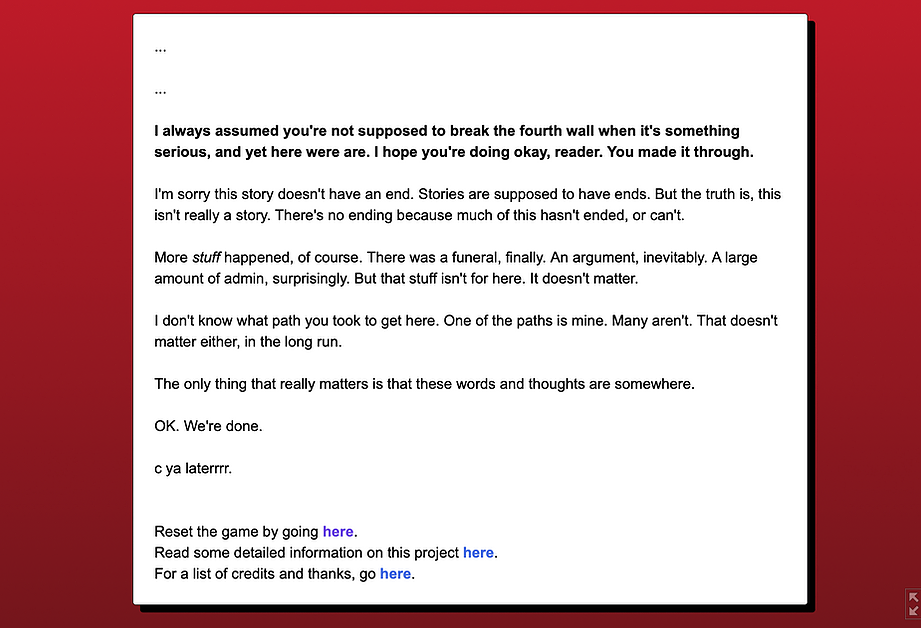c ya laterrrr @ Dan Hett
Made by: Dan Hett
Review date:
Emoji summary: 👥📝🔎
Review by: GDLP
Content warning: talk of the Manchester Arena Bombing
I was about to have dinner but an hour has passed. An hour? I’m not sure, more or less. I read a game or played a book, and now that time is spent. I’ll stay to write about it before I move on and have an evening. It’s November 4th and there are rogue fireworks like grey electric spittle appearing in the sky every now and again. I’ve had the lights on since 10am this morning. It’s been so dark all day.
I have a tab open on safari for c ya laterrrr, a game that is only text. A twine game. Black font on a white rectangular background; a black drop shadow on one corner of a box that hovers over flat, blood-red space. That’s it, that and the text. You read a few lines and pick an option at the end of the paragraph - whichever one you want - and then the next part of the story appears and you do the same again; making decisions to move through the game as you like.
c ya laterrrr was made by artist and developer Dan Hett. In 2017, Hett lost his brother in the Manchester Arena bombing, the one that happened in the foyer at the end of the Ariana Grande concert when lots of young people and parents were leaving the building, about to go home. 22 people were killed and many more injured, and this game starts the night of. You - walking in the footsteps of Hett - are getting into bed. You see some fuss on Twitter about a commotion and wonder what it’s about. You go to sleep only to wake up to hundreds of notifications, missed calls and texts, all of them questions like: have you seen your brother? He’s missing, do you know where he is? He was at the concert. And so begins a singular day, one suspended in shock and in amber by the writing. The game feels speechless even though it is made only of words.
At the end of play, Hett breaks the fourth wall and tells you that only one of these paths through the story is true; by which I mean, it’s what he did and how he lived through his pain and healing. I normally take time to detail everything that happens in a game but I can’t say enough here, not holistically. I took one route through his words, one of many, and it was only how I thought I would cope if I were him.
Like, I wondered where my brother was and what I should do. I wondered where I should go, and when I spoke to people or looked online, I wondered what I should say. There was a lot of watching the news and waiting, and getting together with family to do that waiting together. Very quickly, I was sat in the front seat of a police car in a blue-light drive to the arena. We went to see Mum and to hear and wait some more, this time alongside everybody else in a busy room of broken kin. Officers finally brought our relatives and his friends into a room together to let us know they’d found ID in the pocket of one of the victims and that they could confirm the loss. And a while after, once the dust had settled, it was arranged so that we could visit the foyer of the arena ourselves. It was private, no time limit, no push. The room was empty and battered with impressions of shrapnel, and there was a single tile on the floor smoothed where the blast had begun. All around the space, there was a rose where every victim was found. And 7ft from that smoothed out tile, a rose was lying down next to a candle to show us where he was when it happened.
I’ve only read one small book this year. Whenever I try to read, I fall off the page. That, or I realise my eyes weren’t recording and I have to rewind and start again. That didn’t happen here; I kept my balance through it all. I read in straight lines and I didn’t stop until I came to the story’s dead end. I cried at the roses, and I felt for everyone involved.
The subject, the bombing, the fear and tension all held my eyes wide open throughout. I’ve been thinking recently about this, the way I am a person who falls for the pathological draw of the news cycle - the round and round in circles reading, watching and listening to people talk about an event to no end. It’ll be something I have nothing to do with, somewhere I am not but I’ll be there attentive and spiralling. And when something happens, I don’t start by going to the news, I go: Twitter, search bar, latest. I think I look for accounts from whoever is actually involved, there and then right now because I don’t want their truth to be mediated in any way by the clinginess of journalism, the editors that peel thoughts, nor the webpages framed with adverts that host these knots of fact and opinion. I think if I look hard enough, I can get towards some truth and emotion from someone else’s present tense or memory; and then, when that’s not there, I fall into the trap of shallow news that never really gets close, because they cannot find it, because it’s too soon, or because no one trusts them with their soul.
When this happened in Manchester, I remember being a city over and searching the news for… I don’t know what. I could not believe what had happened. In a dark and (what I hope is an) honest way, I think what I was looking for then (and what I’m maybe always looking for when I click on a trending event like that) is what I found here in this game. There are mentions in the story of the sometimes pushy moments when journalists were coming to Hett for this very raw content at completely awkward and inappropriate times. When I played, I got that story - understood, took time with it, and felt its affirming human-ness below the noise of media. But when I sit to think about it now, it also seems like a story that has written itself down, crumpled up the paper, and been pushed into the mouth of this metaphorical journalist who cannot wait, who is thinking about themselves and their big scoop. Like, Hett has just gotten in front of it all by writing it down in full but in choosing a branching narrative form, he has also created dummies alongside his own account so that these people can’t quite capitalise on his trauma because it’s never revealed to us which story is his. So, it’s there but it’s evasive. The form of the game protects the story by wrapping it up with ghosts and illusions, by formalising it into what feels like the shape of a maze on a downwards tilt. He says there you go, that’s everything. But it’s even more than they asked for. In fact, it’s too much. Which one is it? It’s sort of funny. And I wonder if by writing in this shape, Hett was able to feel some comfort in honesty. I imagine it would help immensely.
I said I cried when the game reached the foyer full of roses. And that wasn’t through any sort of decorated language which I think is interesting. The writing had a certain abruptness in actions and descriptions - a sort of police report in itself. It was writing that showed us the outlines of things with no colouring in, the sort that builds a whole picture very quickly so we know where we are and what’s going on. It was hard and sober and it captured the very strange lucidity that comes with waking grief. You know, how everything feels like a scene from a drama, film or play because so many of us learn about these feelings through culture before we ever feel them in our bellies. Who goes through this - this world-reaching news? It all seems like an act even though it is definitely happening… but even that ‘definitely happening’ is in italics too because of the nature of this game having multiple options built in. Hyperreal and semi-fictional all at once. And at times, those multiple options and space to respond felt like the author was trying to sympathise with me just as much as I was there trying to sympathise with him first.
Clicking through, the second personal singular address, the flattening between myself and Hett in the play through, c ya laterrrr felt like the active reading equivalent to active listening. It made me read closely. More closely than I usually do - and yeah, as I said, I really don’t read at all. I said at the beginning of this review that I read a game or played a book but I wish I knew more words for how this experience felt. There must be other verbs to choose from, like dream, share or receive feel closer to what this does. Maybe instead it is: to eulogise. You play the game, you read the story; you think of everything that happened, how it must have felt, how it must stay in everybody’s memories all these years on, how they carry its weight. And as you do, you eulogise.
If you’re here at the end of the text, please comment a magnifying glass 🔍 emoji on our Instagram or share the text with a magnifying glass 🔍 emoji on Twitter


